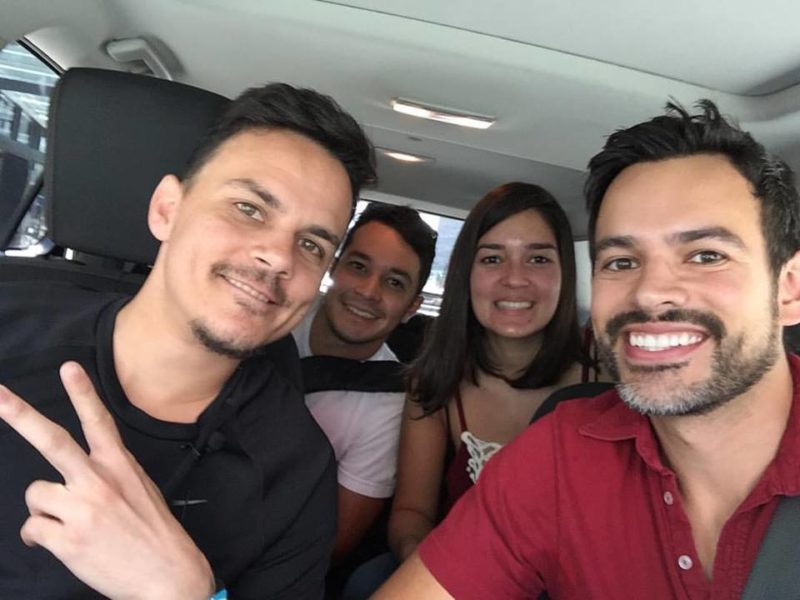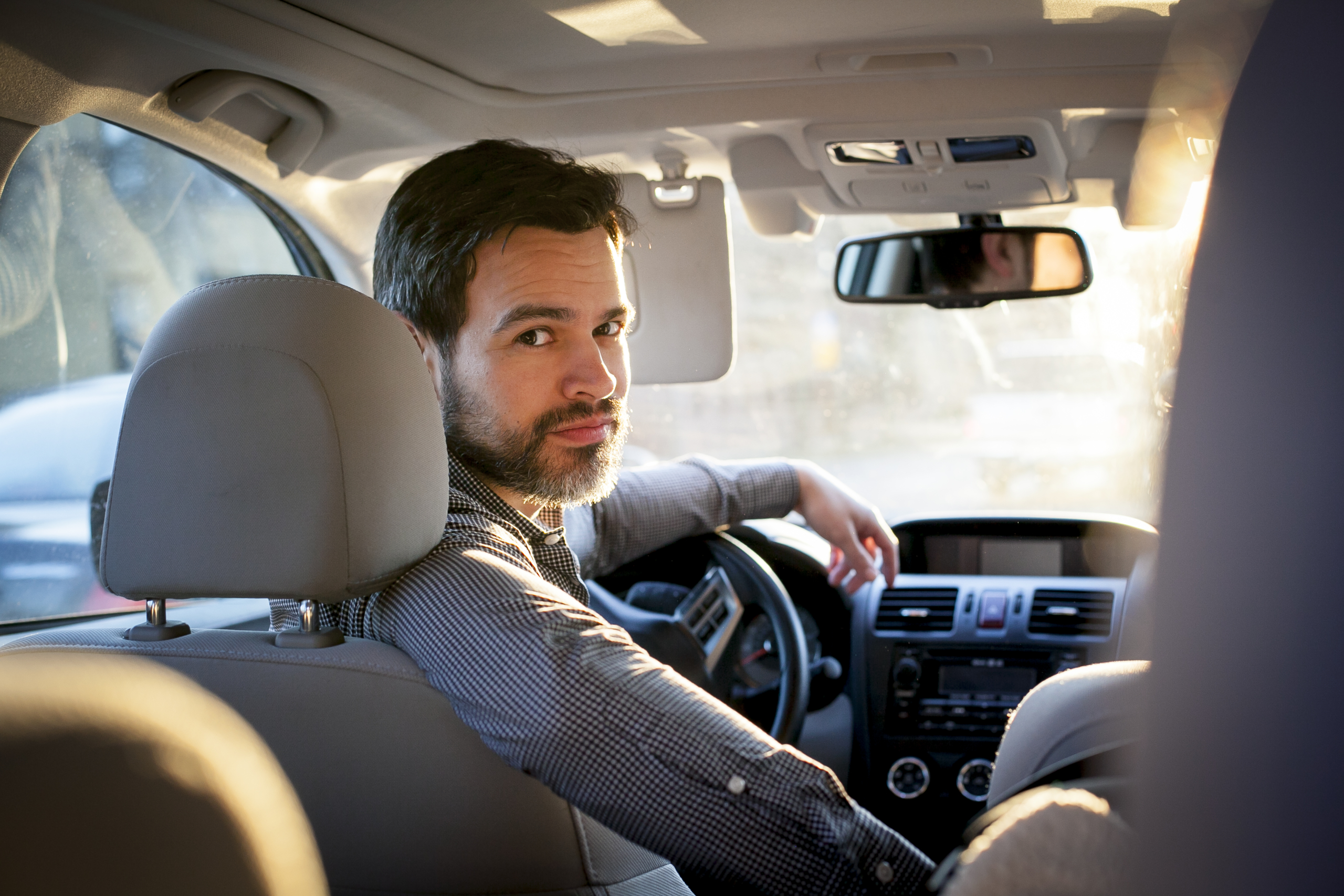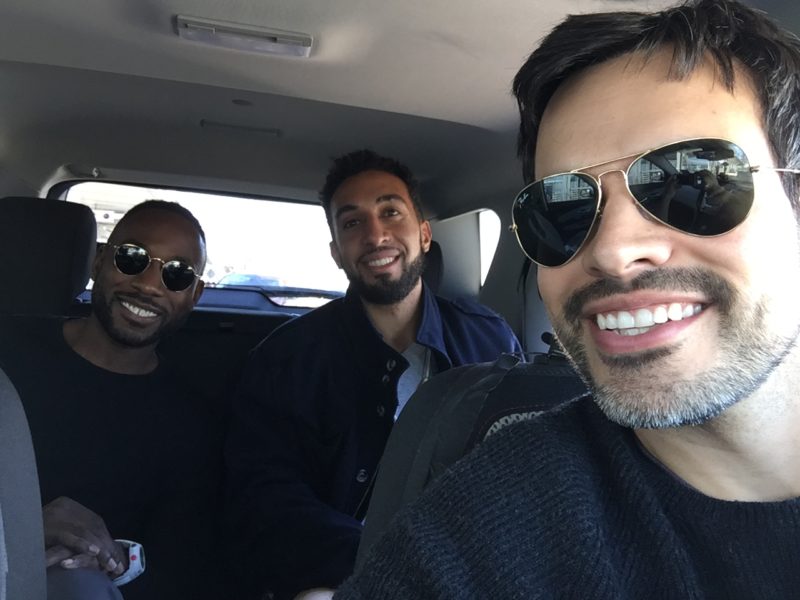Sign up for The Media Today, CJR’s daily newsletter.
Anchor and reporter at NBC is a job most journalists dream of having. Anthony Ponce left just such a gig last year to be a Lyft driver and create an independent podcast.
Many of his bosses and colleagues thought he was crazy, but his wife (who was pregnant with their first child at the time) and family supported his decision. Ponce grew up in a TV news family—his father Phil Ponce hosts WTTW’s Chicago Tonight and his brother Dan works at WGN-Channel 9 as a morning anchor. But Ponce grew disillusioned with traditional media and wanted to escape the formulaic nature of local news. Feeling compelled to make a deeper impact, Ponce quit his job at NBC–owned WMAQ-Channel 5 in Chicago to create and host his storytelling project, Backseat Rider.
On the podcast, Ponce picks up Lyft riders in his Chevrolet Equinox and they dive into conversations sparked by thought-provoking question of the week such as: “Do you believe in signs?” and “What keeps you up at night?” After starting the project in October 2016, Backseat Rider has been downloaded more than 1.5 million times, with an average of about 30,000 downloads per episode. The show is on Podcast One, the largest advertiser-supported digital audio network.
RELATED: Equipment you’ll need to start your own podcast
In an interview with CJR, Ponce talked about leaving mainstream news media to create the podcast, turning a passion project into a business, and how he hopes to see journalism move into a model of “aggressive listening” as opposed to repetitive news coverage. The conversation has been edited for length and clarity.
What sparked you to leave a high-profile and stable job to pursue a passion project like Backseat Rider?
I feel like there’s this formula for local that gets repeated over and over again. It felt like I was a part of this machine that helped create that dynamic, and I didn’t feel good about that. I noticed that I would find myself talking to my Uber or Lyft driver all the time, and I kind of had a light-bulb moment. There’s a renewable resource not being captured, and that is great conversation where people connect. Great conversations are happening all the time, and I wanted to capture it with Backseat Rider.
Listening to the podcast, it feels like Studs Terkel’s Working or Division Street America in a taxi. What is it about the setting that helps you get really profound answers from relatively simple questions?
In an intimate environment like that where you only have an audio mic and no big cameras, people speak with candor. It goes beyond man-on-the-street soundbites; it’s just me and the passenger in the car. It throws people off-guard that I’m aggressively listening to every single world coming out of their mouth. Some get in the car and they’re skeptical—what is this guy doing? But as soon as they realize that I’m listening, they open up. I think it’s obvious when journalists don’t forge that connection, and that’s when you get formulaic answers. But the magic happens when the interview morphs into a conversation. My goal is to bottle that magic every week and bring it to the public.
The magic happens when the interview morphs into a conversation. My goal is to bottle that magic every week and bring it to the public.
Have you ever had riders who just want to get taken to their destination in silence, maybe aren’t in the mood to speak, or feel the topic may be too intrusive?
I’ve given about 500 Lyft drives so far, and I’d say 80 to 90 percent were fine with speaking with me and being recorded. There are people who don’t want to be interviewed, and when that’s the case, I stop recording. And even for those who consent at first, if at the end they don’t want to use it, I’ll scrap it. I want it to be no-pressure.
That being said, there has been one passenger who took exception to my line of questioning. It was a shared ride, and I was having a conversation with a guy. The topic of the week was “What keeps you up at night?” Him and I got into a really deep conversation when another rider got in the car. I gave her the spiel (what I was doing, the podcast, etc.), and she said she didn’t want to be recorded. So the guy and I continue the conversation, and when we got to her stop, she got out and said “Just so you know, it’s rude to ask trauma survivors what keeps them up.” I respected that. That made me rethink what topics I ask when there are more than one person in the car, if I’m already having a deep convo with one person when another gets in the car, etc.
Leaving your job at NBC, you’re moving into a different business model of journalism. Do you make a living strictly off the podcast?
I make nowhere close to what I made at NBC. Now, if I was a single guy living in an apartment, I could do this for a living, but I’m a family guy. I moved my family back in with my parents. My wife and I are renting out our house, and I also took a job part-time on-air stuff with a company called Dose for a morning show on the CW. The podcast hasn’t grown audience-wise where it could be my full-time gig … yet. But the podcast is profitable, and it has a big audience. But I consider it still in the runway phase, and it’s getting more traction every week.
I’m doing my dream job. Those moments of connecting with people that were rare at my previous job are happening all the time with this project. It’s work, but it doesn’t feel like work because I generally love it. On the fulfillment side, on a scale from 1 to 10, I’m at a 10.
Is there any distinction between the type of storytelling you do with the podcast and more traditional reporting? Where do you see your podcast on the business side of journalism?
It’s not journalism in the classic sense. It’s not “news” per se, it doesn’t always have to do with current events … although sometimes it does. After President Trump’s “locker-room talk” comment was made public, I asked all the female riders how they reacted to it, and if they wanted to share their own personal experiences.
So while it’s not journalism in the classic sense of the word, it is a form of journalism that reaches into much deeper territory, and I hope it’s public service for the current environment. What drives me is achieving a level of authenticity that I think is missing in journalism, not clicks and shares. We’re in a weird landscape, but I think there’s a healthy balance between things that can get you those metrics, and journalism that is important in the truer sense of the word.
Did you have any broader goals you wanted to achieve with this podcast?
I think journalism has an authenticity and credibility problem. I wanted to address that with this podcast. The second part of it is, we’ve never been more divided in terms of our national dialogue. I want to remind people that we are all sharing the human experience. What I constantly hear from my listeners is the podcast reminds them that we are not all that different. We may disagree on topics or issues on the national stage, but I guarantee we can speak and have so much in common about other things that have happened in our lives—dating, family, or traveling experiences; the feeling of being angry, or excited, or jealous. It’s my mission to capture those things. I wanted to create new form of journalism that reminds us that we are not all that different.

Ponce says his goal with the podcast is, in a time of divisive discourse, to remind people “we are all sharing the human experience.” Courtesy photo.
What advice would you give to other journalists who wanted to take that leap of faith to pursue their creative passions?
I recognize that I’m saying this with a lot of privilege and flexibility. A lot of people aren’t in the financial position to walk away from a job with benefits, insurance, and a good salary when you have a wife and kid. But the advice I would give is to ask yourself two questions. The first is “what problem do you want to solve?” and work backwards from that. The second is this … there’s a guy named Tim Ferriss who, instead of “goal-setting”, he talks about “fear-setting”. What he means is, if you take the leap and the worst thing that could happen happened, how long would it take for you to get back to the status quo?
I took an inventory, and said “I break away from NBC and become an independent podcaster who drives a Lyft, what would it take for me to get back to where I am right now as a reporter and anchor at NBC?” And the answer was it would take some time, but I could get back there in a couple of years. There is some sacrifice. Some days I get down in the dumps, and insecure about what I was doing. And then I’m talking to people who are opening up about their struggles with cancer or their parents passing, and it puts my little professional struggle in perspective. So take that inventory, and nine times out of 10, the worst-case scenario isn’t that bad, and you can always get back to the status quo if you need to.
RELATED: 9 podcasts for keeping up with Trump
Has America ever needed a media defender more than now? Help us by joining CJR today.




